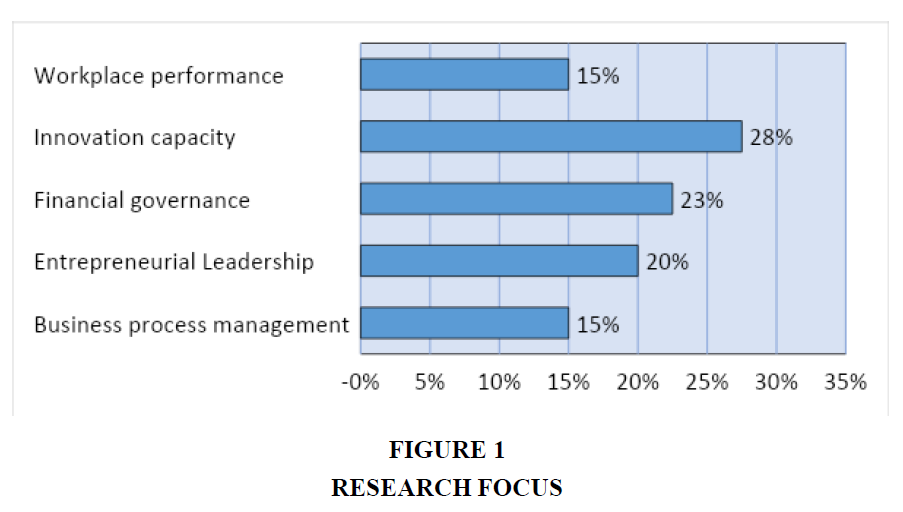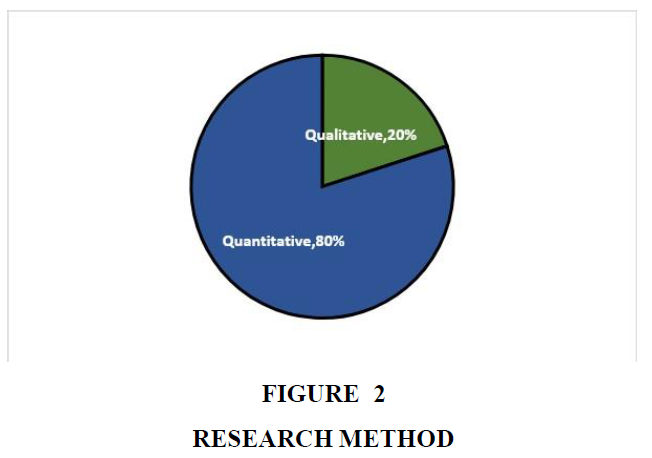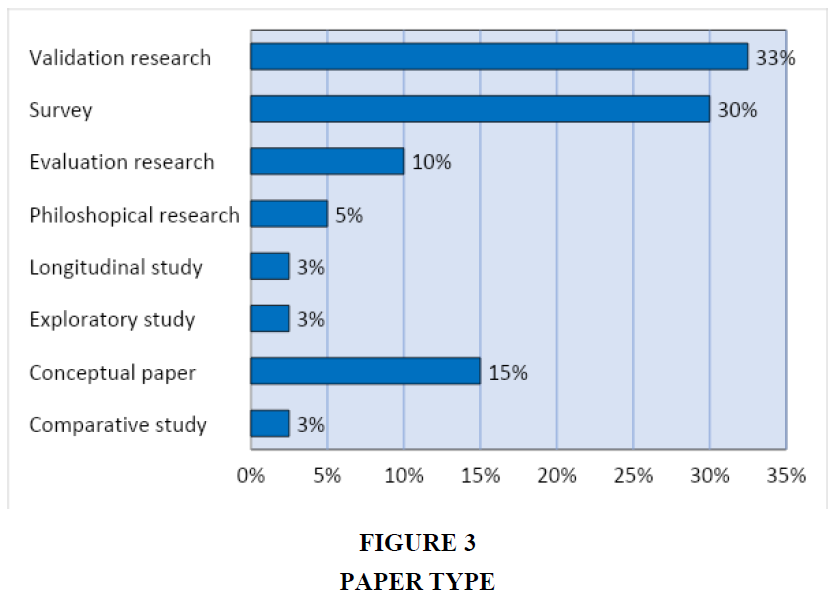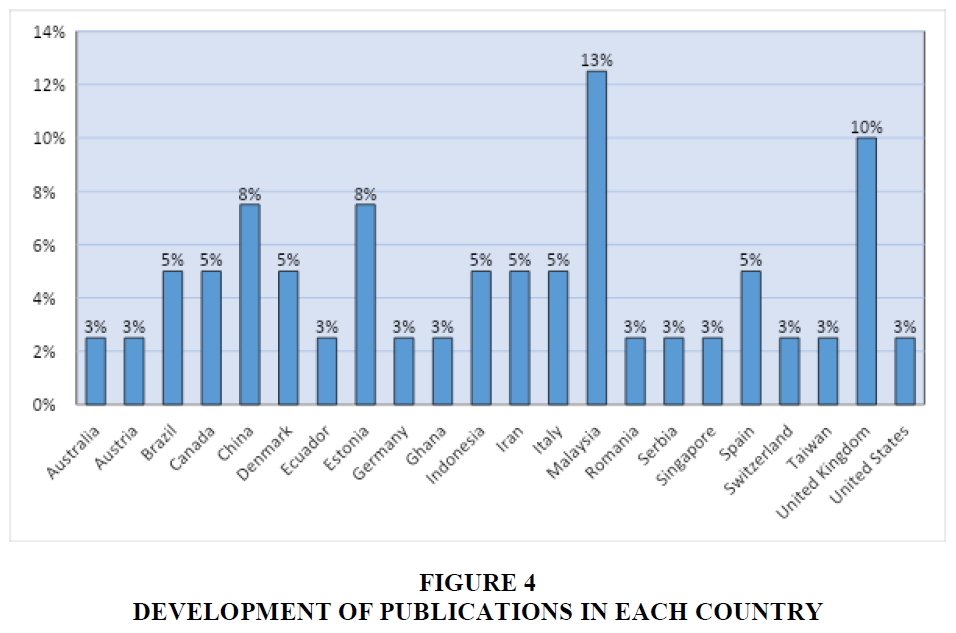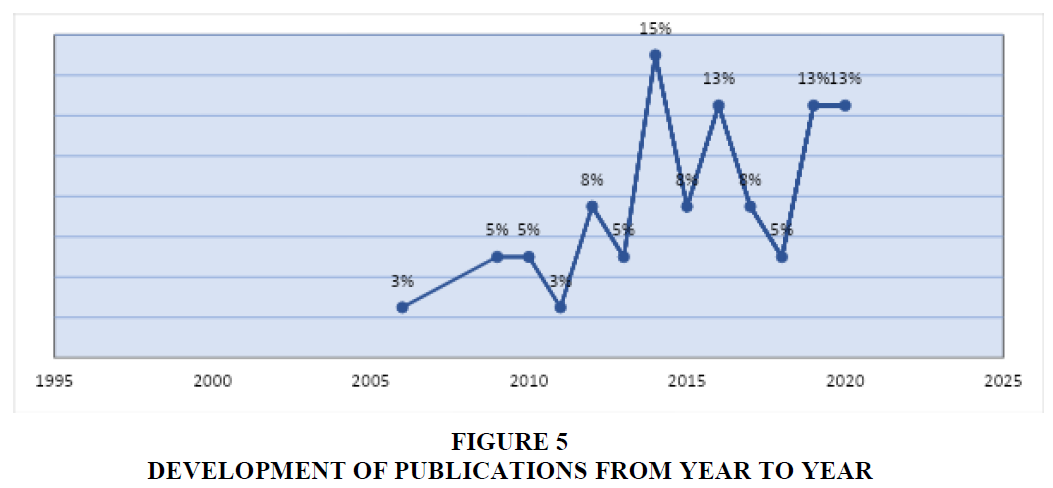Research Article: 2021 Vol: 25 Issue: 6
A systematic mapping study on entrepreneurial leadership and financial governance
Riswin Lubis, Universitas Padjadjaran
Mohammad Benny Alexandri, Universitas Padjadjaran
Citation Information: Lubis R., & Alexandri MB. (2021). A systematic mapping study on entrepreneurial leadership and financial governance. International Journal of Entrepreneurship, 25(4), 1-6.
Abstract
The purpose of this article is to examine and research literature in Indonesia pertaining to entrepreneurial leadership, innovation capacity, workplace performance, business process management, and financial governance. This article's methodology is based on an analysis of existing documents, studies, and literature on Entrepreneurial Leadership, Innovation Capacity, Workplace Performance, Business Process Management, and Financial Governance. Scopus, Google Scholar, Science Direct, and Researchgate.com are some of the places where you can find journals and publications. Systematic Mapping was used to collect data from 40 related papers in this topic and statistically assess them. Authorship pattern, number of published articles, research approach, geographic affiliation, subject, and author gender all were investigated in this study. General The outcomes of this study show that the majority of previous research on the topic has focused on the topics that have been examined, the methodology and paper type adopted, and the long-term publishing pattern.
Keywords
Entrepreneurial Leadership, Innovation Capacity, Workplace Performance, Business Process Management, Financial Governance, SMEs.
Introduction
The Systematic Mapping Study (SMS) is based on literature review (SLR) studies that were first used in IT research. The goal of SLR research is to find, assess, and interpret all relevant and available literature sources relating to the research questions that have been formulated (Petersen et al., 2008; Banaeianjahromi & Smolander, 2016). The most typical motivations for doing SLRs are: first, to summarize existing data on the issue; second, to identify gaps in current research and make recommendations for future study; and third, to offer context for positioning new research.
The first step is identifying most important keywords. The second step is to look at well- known studies in the field of entrepreneurial leadership, innovation capacity, workplace performance, business process management, and financial governance. In this research, researchers focus on the topics of entrepreneurial leadership, innovation capacity, workplace performance, business process management, and financial governance. The third step is to seek for different types of keywords to utilize in the search.
The final step, according to Banaeianjahromi and Smolander (2016), is to use the Boolean operator, whose function is to synthesize into one search string; however, in this study, the operator is not used Boolean AND or OR because the researcher discovered that if the string combination is "entrepreneurial leadership" OR "innovation capacity "OR" workplace performance "OR" business process management "OR" financial governance "AND (sme OR smes OR" small and medium enterprises "OR" small and medium enterprises"), researchers found 1,876 results.
The final phase is to identify the category of exclusion articles (exclusion criteria) and inclusion articles (inclusion articles), which is one of the mapping study tasks for excluding irrelevant articles and include relevant ones (Petersen et al., 2008). We developed exclusion and inclusion criteria in this study to make mapping easier (Table 1).
| Table 1 Inclusion and Exclusion Criteria | |
| Inclusion | Exclusion |
| 1. Entrepreneurial leadership, innovation ability, workplace performance, business process management, and financial governance research | 1. Papers that do not explore entrepreneurship, innovation, workplace performance, business process management, or financial governance. Other than English, there are two types of languages. |
| 2. The English language | |
| 3. Articles and scholarly journals are the only options. | 3. Dissertation, thesis, chapter of a book, product description, presentation, work report, trade literature, editorial notes, and strange literature |
| 4. Papers that have been subjected to peer review 1. Papers that do not explore entrepreneurship, innovation, workplace performance, business process management, or financial governance. Other than English, there are two types of languages. 3. Dissertation, thesis, chapter of a book, product description, presentation, work report, trade literature, editorial notes, and strange literature 4. Peer-reviewed papers that haven't been peer-reviewed |
4. Peer-reviewed papers that haven't been peer-reviewed |
| 5. Research that is duplicated | 5. Research that is duplicated |
A total of 40 articles were found to be relevant or meet the inclusion criteria. The data on the Ms. application was then tallied by the researchers. Excel 2016 allows you to categorize your findings. The mapping results based on research questions are the subject of the next discussion (RQ). They are grouped into categories of research focus, methods, paper type, country, years, and research developments around the world published by Scopus based on the results of mapping from 40 articles on entrepreneurial leadership, innovation capacity, workplace performance, business process management, and financial governance.
Discussion
RQ1: The research question (research focus) to respond to QR1, we categorized 40 articles that were classed with reference. The first stage of calculating articles is based on research topic areas (research focus) with the following categories: business process management, entrepreneurial leadership, financial governance, innovation capability, and workplace performance. The topics that are most researched are research with a research focus of Innovation capacity as much as 28 percent, Financial governance as much as 23 percent, Entrepreneurial leadership as much as 20 percent, Workplace performance as much as 15 percent, and Business Process management as much as 15 percent (Figure 1).
RQ2: Article Types and Methodology (paper type) Because of the nature of testing and evaluating, the majority of previous researchers used a quantitative method approach with a total of 80% of the study outcomes from search results in respectable scientific journals. While qualitative research was performed in 20% of the studies, quantitative research was used in the remaining 80% (Figure 2).
Banaeianjahromi & Smolander's research led to the grouping of articles based on article type categories (2016). Figure 3 depicts the distribution of article kinds (paper types) according to classification categories (Banaeianjahromi & Smolander, 2016; Petersen et al., 2008; Wieringa et al., 2006). According to the findings of the (systematic mapping study), validation research is the most commonly employed type of research, accounting for 33% of all research. The next most common sort of study is survey research, which accounts for 30% of all research.
The percentage of research that is conceptual (conceptual paper) is 15%, evaluation research is 10%, philosophical research is 5%, and research is based on the type of article. A long-term study The exploratory study and the comparison study are the least investigated types of research, accounting for 3% of all studies.
Previous study based on the aspect of the type of article (paper type) demonstrates that validation research is currently used in the emphasis of entrepreneurial leadership research. Validation research, according to Wieringa et al. (2006), is a novel investigative method that has not been used in practice (experiment / observation). The findings of previous research based on the type of article, validation research.
Validation studies are currently focusing on business process management (23%), entrepreneurial leadership (8%), financial governance (31%), innovation capacity (15%), and workplace performance (15%) (23 percent) From 2009 through 2020, the research themes were investigated. The research position was on factors (1) Business process management, (2) Entrepreneurial Leadership, (3) Financial Governance, (4) Innovation ability, and (5) Workplace performance, which is being contested critically and exploratively based on the SMS results.
RQ3: What is the publication trend over time? According to the mapping results, Malaysia produced the most research on the following topics: (1) Business process management, (2) Entrepreneurial Leadership, (3) Financial Governance, (4) Innovation capacity, and (5) Workplace performance, with a total of 13%, followed by the United Kingdom with 10%. Then there's Indonesia, which has a 5% research distribution.
Figures 4 & 5 depicts a trend of research published on electronic database media such as DOAJ, EBSCOhost, Emerald, Gale-Cengage, Jstor, ProQuest, SAGE Publisher, Science Direct, Scopus, Springer, and Google Scholar, which began in 2006. However, based on search results, we discovered that research did not continue to increase, with the number of publications decreasing in 2018. However, the number of publications began to rise in 2014, and by 2019, 13 percent of studies on entrepreneurial leadership, innovation capacity, workplace performance, business process management, and financial governance had been published.
(1) Business process management, (2) Entrepreneurial Leadership, (3) Financial Governance, (4) Innovation capability, and (5) Workplace performance are the essential criteria that MSMEs are debating in the twenty-first century. SMS is a useful research approach for determining which topics to investigate and which regions require further investigation. The findings of this study provide advice to help scholars plan future research by identifying research gaps (Gaps).
References
- Banaeianjahromi, N., & Smolander, K. (2016a). Understanding obstacles in Enterprise Architecture Development. ECIS, ResearchPaper7.
- Banaeianjahromi, N., & Smolander, K. (2016b). What do we know about the role of enterprise architecture in enterprise integration? A systematic mapping study. Journal of Enterprise Information Management, 29(1), 140?164. https://doi.org/10.1108/JEIM-12-2014-0114
- Petersen, K., Feldt, R., Mujtaba, S., & Mattsson, M. (2008). Systematic mapping studies in software engineering. EASE'08 Proceedings of the 12th International Conference on Evaluation and Assessment in Software Engineering, 68?77. https://doi.org/10.1142/S0218194007003112
- Wieringa, R., Maiden, N., Mead, N., & Rolland, C. (2006). Requirements engineering paper classification and evaluation criteria: A proposal and a discussion. Requirements Engineering, 11(1), 102?107. https://doi.org/10.1007/s00766-005-0021-6
